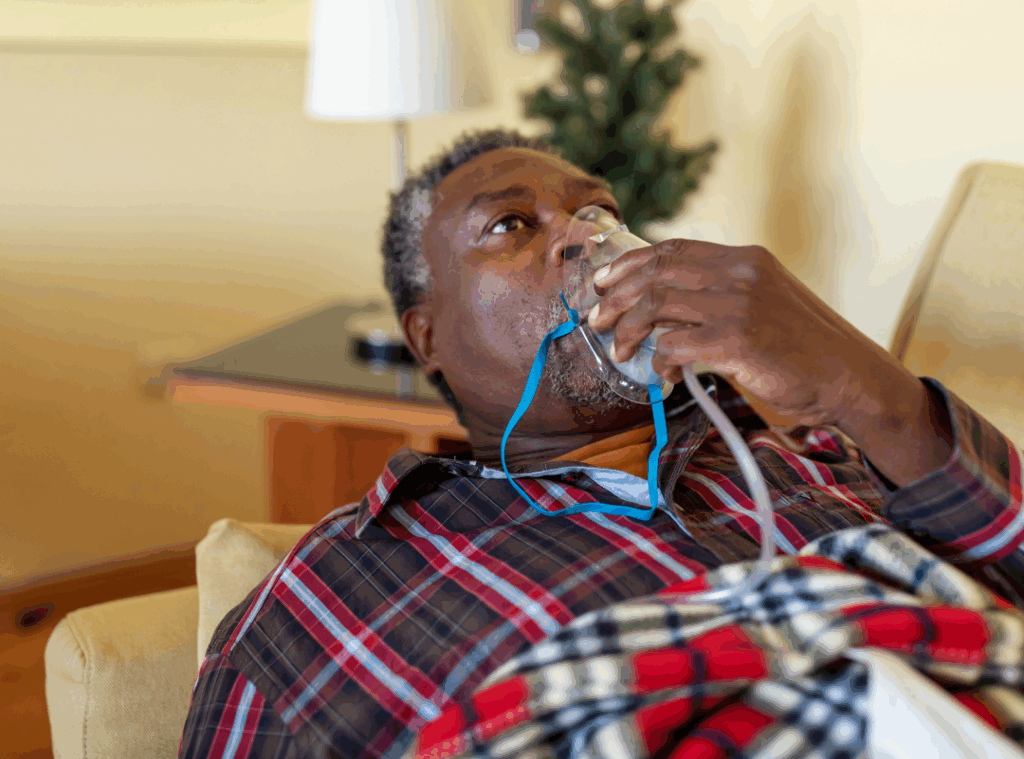Pneumonia in seniors is a growing concern due to age-related immune decline, chronic conditions, and increased vulnerability to complications. As we age, our bodies become less equipped to fight off infections, making pneumonia especially dangerous for those over 70.
Recognizing early signs and understanding the progression of pneumonia in elderly adults can drastically impact outcomes. Whether you’re concerned about the survival rate of a 70-year-old with pneumonia or the outlook for someone in their 80s or 90s, early detection and proper care are critical to improving quality of life and survival chances.
Subtle Symptoms of Pneumonia in Older Adults
Identifying the subtle signs of pneumonia in older adults can be the first step in preventing a serious health decline. Unlike younger individuals, seniors may not experience fever or a deep cough. Instead, look for signs like:
- Sudden confusion or delirium
- Weakness or fatigue
- Loss of appetite
- Rapid breathing or shortness of breath
- Unsteadiness or dizziness
These non-classic symptoms can often lead to delayed diagnosis. It’s also important to monitor for changes in daily habits or physical condition. Even urinary incontinence or changes in speech can indicate an early onset. Additionally, overweight and obesity are risk factors that can worsen pneumonia recovery outcomes.
Increased Risk Factors for Pneumonia in Seniors
As seniors age, their risk for developing pneumonia increases for several reasons. These include not only age-related immune decline but also existing health conditions and medication use.
Age-Related Immune Decline
The natural weakening of the immune system with age leaves older adults more susceptible to infections. Reduced white blood cell production, poor antibody response, and chronic inflammation contribute to this vulnerability. These changes make pneumonia in seniors more likely to result in hospitalization or worse.
A diminished vaccine response can also affect outcomes. This is why healthcare providers stress the importance of early and consistent vaccinations to bolster the defense against pneumonia.
Chronic Health Conditions
Conditions like heart disease, diabetes, and COPD can impair lung function and immune response. In seniors, managing these chronic illnesses is a critical strategy to prevent pneumonia. Regular health screenings, proper medication adherence, and lifestyle adjustments are crucial for reducing risk.
Don’t overlook preventive measures like the annual influenza vaccination, which can significantly lower the chance of developing complications from the flu that can lead to pneumonia.
Weakened Immunity and Nutrition
Poor nutrition is another significant contributor to immune decline in older adults. Inadequate intake of protein, vitamins, and minerals can impair the body’s natural defenses. A heart-healthy lifestyle that includes nutrient-rich meals and physical activity is essential for immune strength.
Challenges in Diagnosis and Early Detection
Detecting pneumonia in the elderly requires vigilance from caregivers and healthcare providers. Seniors may not display typical symptoms, and a delay in treatment can result in severe complications.
| Symptoms | Clinical Indicators |
| Weakness or fatigue | Loss of appetite |
| Confusion | Low/high body temperature |
| Shortness of breath | Chest pain during breathing |
These signs can also be mistaken for other conditions. That’s why it’s critical to treat common respiratory issues with care. Even common cold symptoms can quickly escalate to pneumonia in seniors if not monitored closely.

Understanding Survival Rates and Progression in the Elderly
The impact of pneumonia increases dramatically with age. Factors such as the presence of chronic disease, access to care, and timely treatment all affect survival.
- The survival rate of a 70-year-old with pneumonia depends on overall health and whether treatment is started early.
- The survival rate of an 80-year-old with pneumonia declines due to frailty and reduced physiological reserves.
- The survival rate of a 90-year-old with pneumonia is significantly lower, especially if compounded by dementia or mobility limitations.
- Understanding the end-stage of pneumonia in the elderly can help families make informed decisions. It often involves respiratory failure, decreased consciousness, and a need for palliative care.
Johns Hopkins Medicine and CDC resources offer more data on pneumonia outcomes and prevention for older adults.
Treatment Considerations for Seniors
Treating pneumonia in seniors involves more than just antibiotics. It requires a comprehensive approach tailored to age, mobility, nutrition, and co-existing conditions.
Antibiotic Resistance Challenges
Elderly patients often have a history of prior antibiotic use, which can create resistance. Choosing the right antibiotics may require cultures and sensitivity tests to ensure effectiveness. Adjusting for slower metabolism and renal function is also essential to avoid drug toxicity.
When Hospitalization Becomes Necessary
Seniors with pneumonia may require hospitalization under certain conditions, such as:
- Severe confusion or altered mental state
- Inability to maintain hydration or nutrition
- Low oxygen saturation
- High respiratory rate
For those over 70, hospital care may also help prevent the worsening of chronic conditions during pneumonia episodes. Evaluating the need for hospital admission is critical, particularly for patients with mobility challenges or cognitive decline.
Effective Symptom Management
Good symptom control supports better recovery outcomes. This may include:
- Oxygen therapy for respiratory distress
- IV fluids for dehydration
- Fever management with appropriate medications
- Encouraging movement and breathing exercises
Care plans should be individualized, with careful monitoring of progress. Involving physical therapists and nutritionists often enhances recovery in senior patients.
Complications and Severe Outcomes
Pneumonia is not always easily cured in seniors and can result in:
- Respiratory failure
- Sepsis
- Pleural effusion or lung abscess
- Worsening of heart failure or kidney disease
These complications can be fatal without proper care. Many seniors experience functional decline post-pneumonia, leading to long-term rehabilitation needs or changes in living arrangements.
This is where the risk of the end-stage of pneumonia in the elderly becomes very real. It’s not just about lung infection anymore – it’s about managing total body systems and maintaining dignity and comfort.
Proactive Prevention Strategies
Preventing pneumonia requires a multi-faceted approach:
- Vaccinations: Pneumococcal and flu vaccines should be part of every senior’s healthcare plan.
- Hand hygiene: Frequent handwashing and sanitizing reduce infection spread.
- Lifestyle: Regular exercise, good sleep, and a nutritious diet all contribute to immune health.
- Environmental safety: Avoiding exposure to cigarette smoke and poor air quality helps protect the lungs.
Caregivers play a vital role in reinforcing these habits. Preventive healthcare services, routine screenings, and wellness programs are key in reducing pneumonia cases in older populations.
Take Charge of Your Health and Stay Ahead of Pneumonia
Being proactive is the best defense against pneumonia in seniors. Recognizing early symptoms, understanding personal risk factors, and adhering to treatment plans can save lives. From knowing the survival rate of an 80-year-old with pneumonia to anticipating the end-stage of pneumonia in the elderly, knowledge is power.
At Westmont of Chico, we are dedicated to helping seniors and families take control of their health journey. If you’re looking for more guidance or senior living solutions, call us at 530-767-3886 or schedule a Tour.
Let’s work together to safeguard your loved one’s health and support a stronger, healthier future.
Dive into the vibrant life our Westmont communities have to offer.Find Where You Belong
Frequently Asked Questions
What is the survival rate for pneumonia in the elderly?
The survival rate for pneumonia in the elderly varies depending on factors such as age, overall health, and timely medical treatment. In general, the mortality rate is higher among seniors, especially those with weakened immune systems or chronic illnesses. Hospitalized elderly patients may have a survival rate of around 85%, while those in nursing homes or with severe complications may face higher risks. Early diagnosis and appropriate antibiotic therapy can significantly improve outcomes.
Can the elderly recover from pneumonia?
Yes, many elderly individuals can recover from pneumonia, especially with prompt and proper medical care. Recovery may take longer than in younger adults and could involve hospital stays, antibiotics, and supportive treatments like oxygen therapy. Rehabilitation may also be necessary to regain strength and lung function. Caregivers need to monitor symptoms closely and ensure follow-up care for full recovery.
What are the final stages of pneumonia in the elderly?
In the final stages of pneumonia, elderly patients may experience severe symptoms such as difficulty breathing, low blood pressure, confusion, and unresponsiveness. The lungs may become filled with fluid, leading to respiratory failure. Other signs can include bluish lips or fingers, extreme fatigue, and reduced oxygen levels. At this stage, palliative care is often recommended to manage symptoms and provide comfort.
How serious is pneumonia in adults?
Pneumonia can be very serious in adults, particularly for those over age 65 or with underlying health conditions. It can cause complications such as respiratory failure, sepsis, or lung abscesses. While many healthy adults recover with antibiotics and rest, high-risk individuals may require hospitalization. Early treatment is crucial to prevent the illness from progressing to a life-threatening stage.









